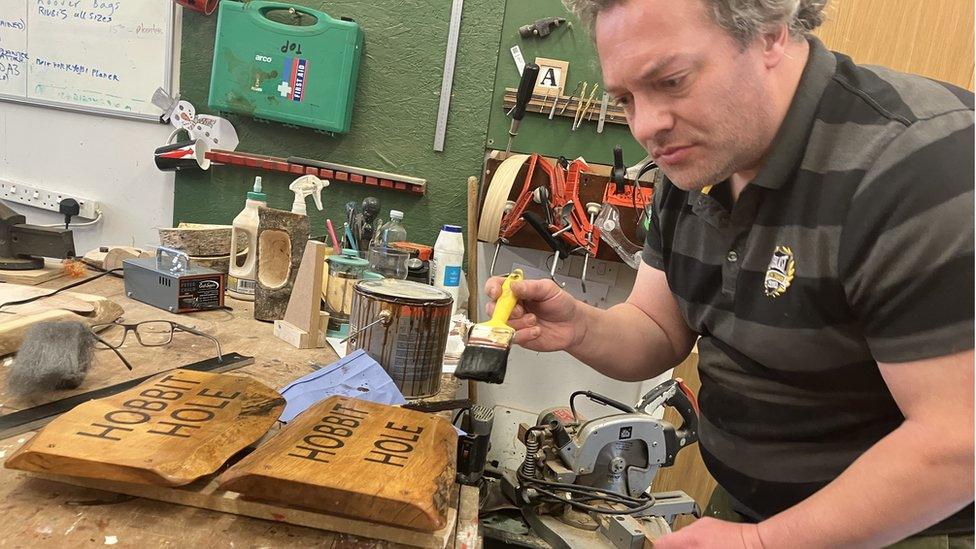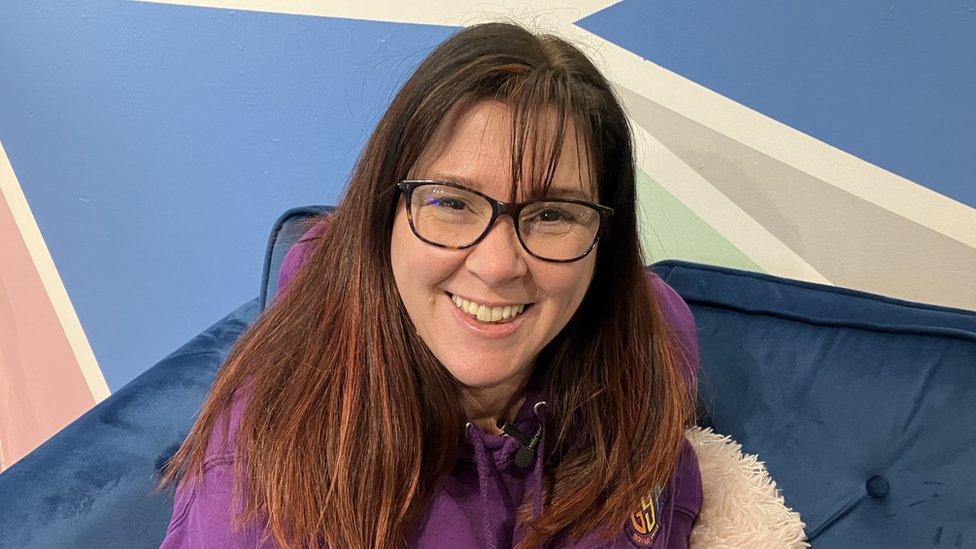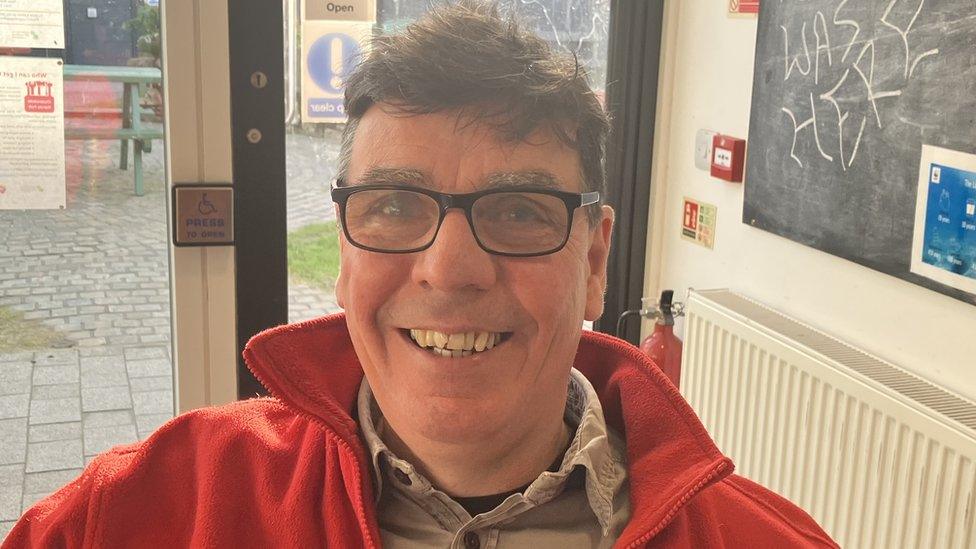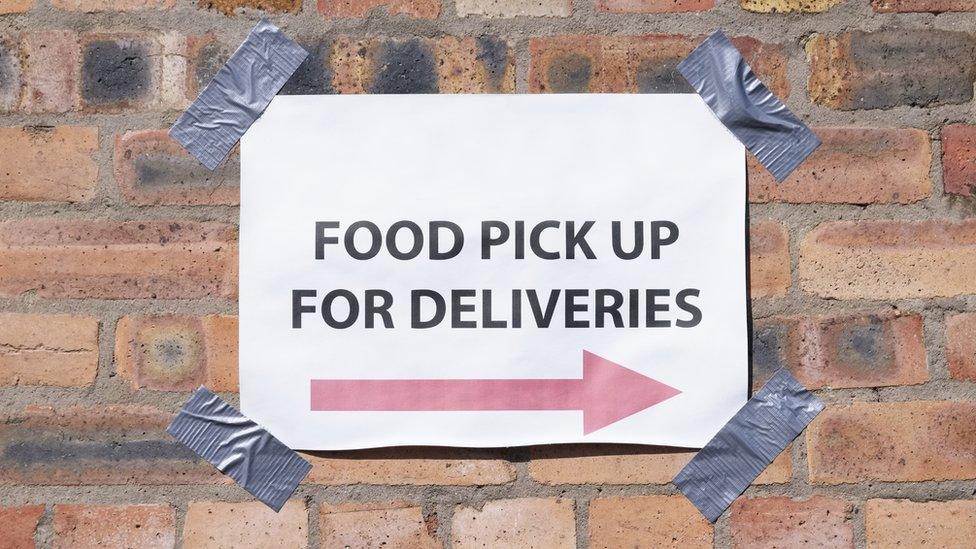'Perfect storm' could see voluntary groups shut
- Published

Clydesdale Community Initiatives supports people with complex needs to "make a contribution to their community"
Large numbers of Scotland's voluntary organisations could close due to a "perfect storm" of Covid and the cost of living crisis, it has been claimed.
Paul Bradley, from the The Scottish Council for Voluntary Organisations (SCVO), said more people were in need of charitable services than ever, at a time when their costs had skyrocketed.
He said there was less funding available just as they needed it most.
The Scottish government said it was looking at a range of measures to help.
A survey of Scotland's voluntary sector, seen by BBC Scotland, found 93% of organisations that responded reported an increase in costs in 2022 - and 43% said these rises were negatively impacting their ability to deliver services.
There are about 45,000 charitable organisations in Scotland and the SCVO warned a "conservative estimate" was that 1,300 would be unable to open their doors in a year's time.
Mr Bradley said: "We're deeply concerned.
"We're fearful for the thousands of voluntary organisations at risk, but I'm also fearful for the people that need to access that vital support."
'We're the easiest to drop'
The Royal Voluntary Service is one such organisation affected - on Wednesday it confirmed it will stop offering some of its services in Aberdeen and Moray from next month.
The charity, one of the largest voluntary organisations in the UK, said it will close its transport and home support services due to a lack of available funding.
But smaller community organisations are particularly worried, as they often receive less funding and national publicity.

Girvan Youth Trust supports 300 young people
Girvan Youth Trust, which supports about 300 young people in the Ayrshire town and surrounding villages, saw its gas bill increase by 100% in the past month alone.
The trust runs six days and nights per week, including club nights, employment projects and a support group for young people with additional support needs.
Project coordinator Gail McMaster said the service was vital.
"Lots of our young people that visit us are vulnerable," she said. "One of the biggest increases we've seen is young people coming to us and they're hungry, so they'll attend a group at night and their parents are under huge pressure to work more hours.
"So that knock-on effect is a teenager may come home from school and not have eaten, not come into a warm home, not have a warm meal."

Gail McMaster says the group would never charge for its services
Ms McMaster said that to address this, the club is putting on more free food and they "don't charge young people a penny" to come into any groups.
"We will never do that, because as soon as we charge to come in, the most vulnerable people won't be able to attend," she said.
However, it used to cost between £39,000 to £44,000 "just to open the doors" to the centre - a price which Ms McMaster said could increase to £65,000.
"As a small charity, we are not funded by a local council or the government," she said.
"In the long run, I don't know whether small charities will be able to continue running."

Niall McShannon feels local volunteer organisations have been "abandoned"
Niall McShannon, who is managing director of Clydesdale Community Initiatives (CCI) in Lanark, feels as though local volunteer organisations have been "abandoned" despite all the work they did during the pandemic.
CCI supports people with complex needs to "make a contribution to their community".
This includes activities from growing food to working in their wood shop and social enterprises to make products to sell for the community.
"The demand for people to access activities like ours is higher than I've ever known it in 35 years of working within the sector," Mr McShannon said.
"At the same time we have considerable financial stresses and the funding environment is exceptionally difficult."
During the pandemic, Mr McShannon said the CCI was part of an "amazing" community response that received a great deal of recognition from local and national governments - something that has since slipped away.
He said this is particularly frustrating as organisations such as CCI can reduce demand on the health and social care services.
"It feels as though we're the easiest to drop, when in fact we could be a significant part of the solution for a relatively small investment," he said.
Calls for support
To address the financial black hole that many voluntary organisations are facing, the SCVO is calling on the Scottish government to bulk purchase energy on better terms for voluntary organisations to access.
They are also urging the government to give greater support for staff and volunteers through the cost of living crisis.
Mr Bradley added that despite 5% of the Scottish workforce being based in the voluntary sector, they haven't heard a great deal about pay for those staff delivering public services.
A Scottish government spokesperson said: "We recognise the strain the current cost crisis is placing on charities and third sector bodies and are looking at a range of measures to help.
"It is already the case that some third sector bodies are part of the bulk-buying arrangements that we have in place for the wider public sector. We are entirely supportive of adding others where appropriate when this becomes possible."
- Published16 January 2022

- Published5 February 2022
